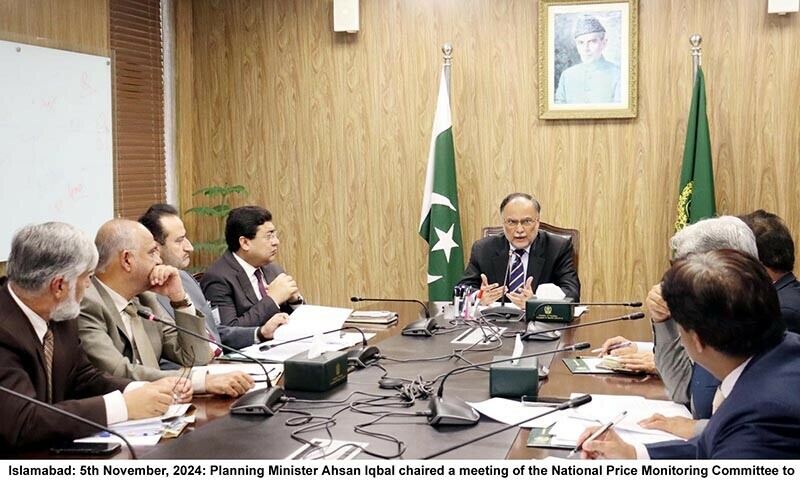
[ad_1]

ISLAMABAD: The National Price Monitoring Committee (NPMC) directed provincial chief secretaries on Tuesday to conduct regular price evaluations at the district level in collaboration with the Pakistan Bureau of Statistics (PBS) to keep an effective check on the price of essential items items.
The NPMC meeting chaired by Planning Minister Ahsan Iqbal also emphasised the need to avoid duplicated efforts by coordinating closely with the PBS for data-driven decisions and effective price control.
An official announcement said the minister underscored the importance of adjusting transport fares to reflect the slow down in inflation and ensuring that the public benefits from reduced transportation costs across markets.
The committee examined discrepancies between wholesale and retail prices in various regions, with a directive to establish a database for chief mnisters’ review. This initiative aims to improve transparency, curb profiteering, and bring greater stability to consumer prices at the local level.
Local market committees were instructed to ensure essential commodities’ availability by actively monitoring demand and supply.
Every deputy commissioner has been tasked with overseeing district-level stock to avert shortages.
The minister reiterated the critical role of data analytics in future planning. He urged all provincial and federal units to utilise PBS data, enabling informed decisions for price stability and productivity improvements across sectors. Efficient data usage, he noted, is essential to achieving economic resilience and supporting the public amidst inflationary challenges.
To mitigate price spikes, Mr Ahsan directed that demand and stock availability analyses be proactively conducted for critical periods, especially during Eidul Azha and Ramazan. He stressed that preparation for these high-demand seasons should anticipate potential supply pressures to prevent market disruptions.
He highlighted the importance of a structured business plan for agriculture, urging the establishment of national production targets to align with domestic needs and export potential. Each crop should have a clear business model with annual targets, mirroring practices in developed countries.
Recognising the need for specialised expertise, he recommended appointing a permanent agriculture economist to guide crop planning and economic projections. Furthermore, he called for enhancing value addition in dairy and agricultural products, particularly in high-potential items like milk, fish, mangoes, and poultry, aiming to develop Pakistani brands for domestic and international markets.
The committee reviewed recent inflation data, particularly in food and essential commodities, using insights from the PBS on the Consumer Price Index (CPI).
In October, non-perishable food items experienced a controlled rise of 1.01pc compared to the previous month and a decrease of 1.46pc compared to October 2023.
A major decrease was observed in the prices of wheat flour (34.73pc), sugar (9.15pc) and cooking oil (10.2pc). Overall, the food inflation reflects high stability in the prices, which declined to 2.7pc in urban areas and . 0.6pc in rural areas from 28.9pc and 28.6pc in October 2023, respectively.
Published in Dawn, November 6th, 2024
[ad_2]
Source link






